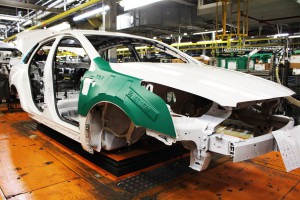
GM is closing three plants in the U.S. and Canada, including its Oshawa, Ontario facility as it transforms its manufacturing footprint.
General Motors, in a move likely to have a significant political impact, confirmed it is preparing to shut five plants in the U.S. and Canada as its restructures its operations across the globe.
GM Chairman and CEO Mary Barra told analysts the company plans to halt production of vehicles, among the them the Chevrolet Volt, Cruze and Impala, now built at plants in Detroit, Lordstown, Ohio, and Oshawa, Ontario. The company also plans to close two powertrain plants.
None of the plants will have products allocated to them past the end of 2019, said Barra. As part of the unfolding restructuring of the company GM also plans to slash is salaried head count by 15% and cut its executive ranks by 25% and restructure its product development system, Barra said.
Ultimately, GM will close two more unidentified plants in the future, resulting in 15,000 job cuts. GM had announced pieces of its restructuring plans as it offered buyouts to 18,000 salaried employees earlier this fall and moved to shuttle some 3,000 employees assigned to propulsion development from its engine center in Pontiac, Michigan, to its technical center in Warren, Michigan, in suburban Detroit.
(GM shuttering Canadian plant. Click Here for the story.)
Barra also said GM planned to pursue closer relations with its Japanese partner Honda and did not rule out selling Honda-made products as GM-badged vehicles. The UAW was quick to respond and vowed to fight the GM restructuring.

General Motors is going to shut down its Lordstown, Ohio plant as part of its plans to make the company leaner.
“This callous decision by GM to reduce or cease operations in American plants, while opening or increasing production in Mexico and China plants for sales to American consumers, is, in its implementation, profoundly damaging to our American workforce,” said Terry Dittes, UAW vice president, and director GM Department.
“GM’s production decisions, in light of employee concessions during the economic downturn and a taxpayer bailout from bankruptcy, puts profits before the working families of this country whose personal sacrifices stood with GM during those dark days. These decisions are a slap in the face to the memory and recall of that historical American made bailout.”
Barra noted that while the plants were closing, the company was making investments – and hiring workers – in future products in the battery-electric and autonomous arena.
“This is about making sure that GM is lean and agile and making sure that GM is able to lead in the electric and autonomous vehicle market,” she said, adding, “We’re going to continue to hire because when we look at the skillsets we need for the future, they’re focused on software-oriented (hires)” because the future vehicles will rely more and more on computers.
News of the plant closings began to emerge during the holiday weekend with reports shutdown of the Oshawa plant, which currently assembles slow-selling sedans such as the Chevrolet Impala and the Cadillac XTS.
Unifor, the union representing autoworkers in Canada, said it has been told there is no car production assigned to the factory beyond next year, raising the prospect of talks to preserve jobs and setting the stage for the closure of the plant.
(Click Here for more about GM looking at white collar layoffs due to low buyout response.)
Workers in Oshawa staged a wildcat strike this morning it protest, according to the CBC.

GM Executive Vice President Mark Reuss during an earlier appearance at the Poletown plant in Detroit producing the Chevrolet Volt.
“We have been informed that, as of now, there is no product allocated to the Oshawa assembly plant past December 2019,” Unifor said in a written statement Sunday night. “Unifor does not accept this announcement and is immediately calling on GM to live up to the spirit” of a contract agreement reached in 2016, the union said.
GM had agreed to make new investment in the Oshawa plant as part of the 2016 agreement, Unifor has said in the past.
The survival of the Oshawa plant was a key issue in the automaker’s 2016 labor negotiations with Unifor, which is the successor to the Canadian Auto Workers. As part of that settlement, GM agreed to spend $302 million in the Oshawa operations and keep work in the plant.
The Oshawa plant employs about 2,200 people, the union says, and was once one of the largest carmaking facilities in Canada. David Paterson, a spokesman for GM in Canada, declined to comment. The potential plant closure was reported earlier by CTV News, which didn’t say where it got the information.
The impending shutdown would mark the end of more than a century of carmaking in Oshawa, which is located east of Toronto.
The plant closings in the U.S. come amid President Donald Trump’s intense focus on creating manufacturing jobs in the U.S. The announced shutdowns are sure to anger the Trump White House.
(GM handily beats earnings forecasts, buoyed by truck sales. Click Here for the story.)
In addition, Sherrod Brown, the newly elected Democratic Senator, demanded that GM protect the Lordstown plant, which is located in industrialized northeast Ohio, which is one of the major battlegrounds in Presidential elections.
